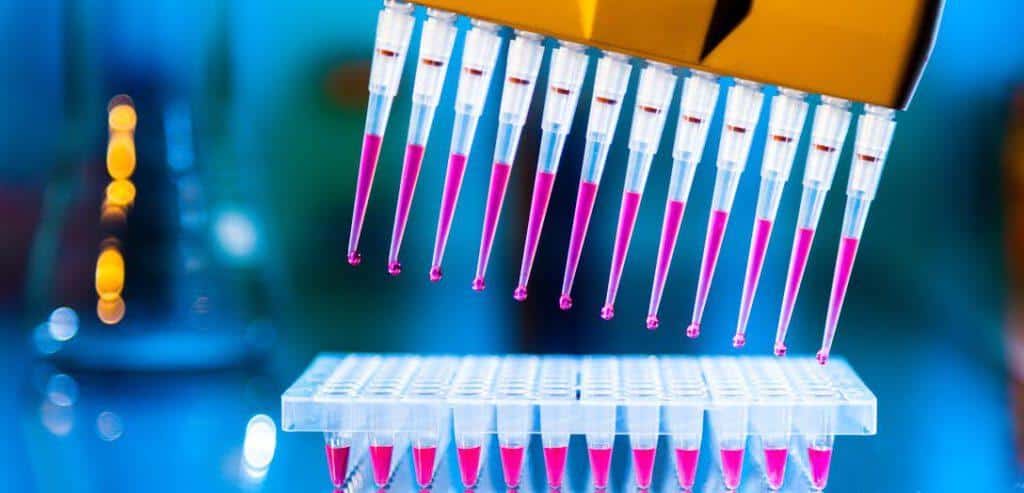
The partners on the UCLA research team have made new discoveries about how genetic mutations can help doctors predict patient responses to cancer-fighting immunotherapy drugs.
In the past, we have spoken a lot about the Central Dogma, which is the idea that genetic information flows from DNA to RNA to proteins. Specifically, a strand of DNA is copied into RNA, a process called transcription, and then the RNA, or messenger RNA (mRNA), provides a which makes a protein, a process known as translation. This process has long represented our understanding of DNA. Just recently, scientists discovered a new class of RNA that is copied from the DNA but never gets translated into a protein. Research into these previously neglected sections of the DNA, the non-coding regions, have revealed a treasure trove of information, including the discovery of a new inherited class of DNA based mutations, like the KRAS-variant.

How non-coding parts of our DNA predict cancer risk and treatment response
The bulk of MiraKind’s research is centered around trying to understand how mutations or genetic differences in these non-coding parts of a person’s DNA can predict both their risk for cancer, as well as how they will respond to cancer treatment. Â One significant discovery we have made, for example, is that women with the KRAS-variant are at an increased risk for developing breast and ovarian cancer. Further, that risk that is elevated when these women are faced with a drop in estrogen (i.e. due to menopause, surgery to remove the ovaries before menopause, etc.).
The role of genetics in predicting response to immunotherapy
Our current research, in collaboration with our sister company, MiraDx, explores how people with mutations like the KRAS-variant will respond to cancer therapy. We are focusing on immunotherapy, A cancer treatment designed to activate a patient’s immune system to help fight their cancer.
Among the best known immunotherapies are a class of drugs called checkpoint inhibitors. T cells are the soldiers of the immune system, patrolling the body to look for abnormal cells that may harm the body. In some cases, tumors have found a way to hide from these T-cell checkpoints by masking their abnormal proteins so that they appear to be regular healthy cells. Checkpoint inhibitors are drugs designed to expose a person’s tumor to their immune system by disabling the tumor’s ability to disguise itself. When the tumor is exposed, the immune system is free to attack it. For some patients, this is a very effective treatment. But, for others, it can lead to some serious side effects when their immune system instead attacks healthy parts of their body, like the liver, lungs, pancreas, skin, or even their heart. However, physicians cannot currently predict which of their patients will have these types of side effects to immunotherapy. We have recently learned that genetic mutations in the non-coding regions of the DNA provide important clues!
Our study findings
In our study, we wanted to see how checkpoint inhibitors impact people with special genetic mutations like the KRAS-variant. We first looked at 60 melanoma patients in whom we found a group of non-coding DNA mutations that were able to predict with 90% accuracy when a patient would have a toxic reaction toxicity to treatment with a checkpoint inhibitor. We then tested if those same mutations would also predict toxicity for patients with other cancer types who received immunotherapy. And, in fact, they did! We are currently extending our testing to patients with cancer of all types, to prove that these non-coding mutations will predict toxicity to immune therapy for everyone, based on their genetics, not their tumors. Our end goal is to help doctors personalize patient care so that they can protect patients from these sometimes life-threatening side effects.
The research team on the first report of this project consisted of MiraDx in collaboration with Dr. Joanne Weidhaas, Kirk Wilenius, Aaron Wolfe Scheffler, Juliana Higa, Donatello Telesca and Mark C. Scholz. The team recently presented our findings at the GU American Society of Clinical Oncology meeting.
This study brings us that much closer to helping us create more personalized healthcare solutions based on the unique genetics of each patient.
Do you have a question about this research? Ask us in the comments below!




Leave a Reply